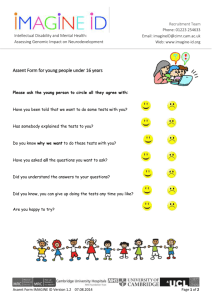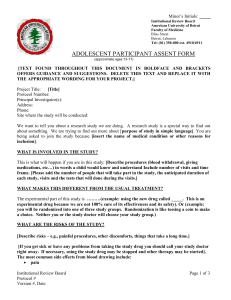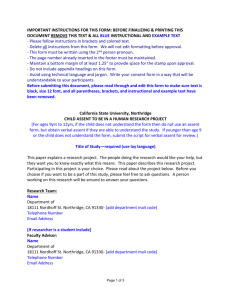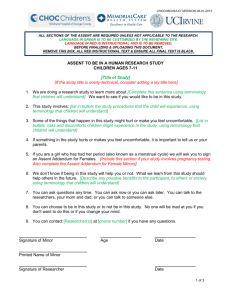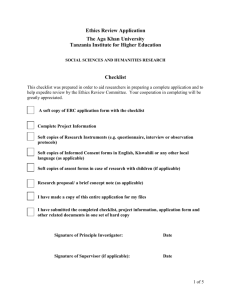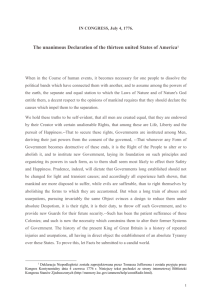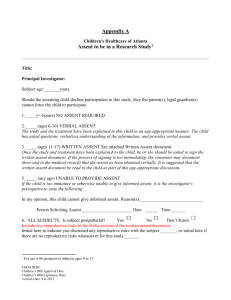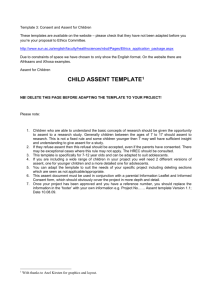Assent Form (Younger and Older Child Versions)
advertisement
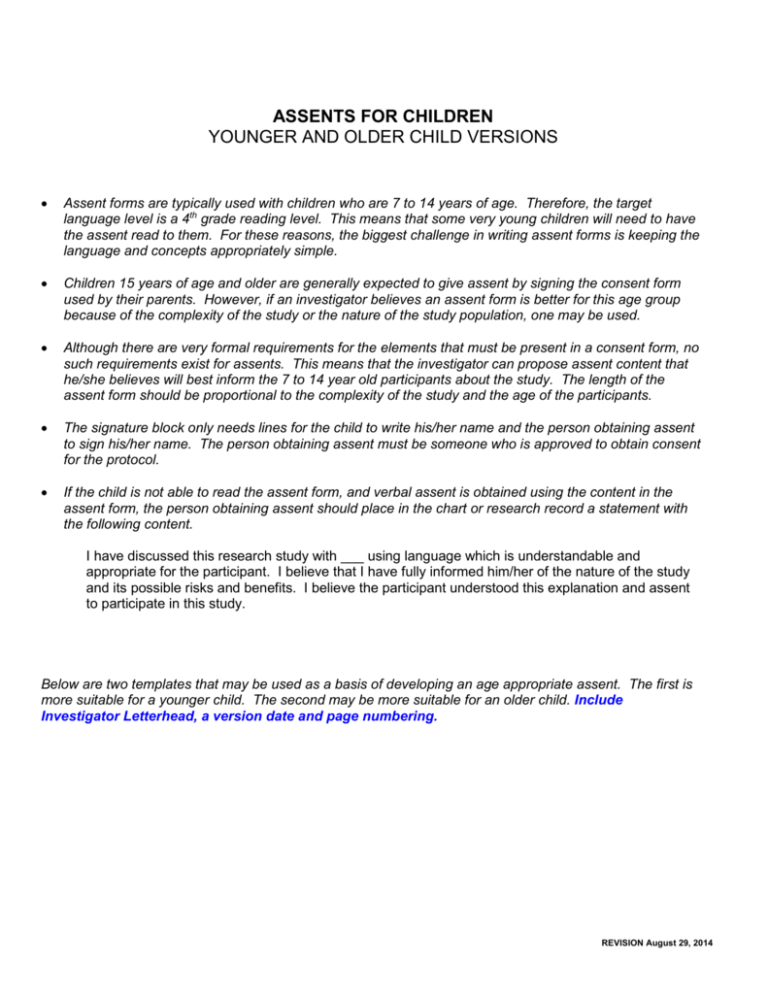
ASSENTS FOR CHILDREN YOUNGER AND OLDER CHILD VERSIONS Assent forms are typically used with children who are 7 to 14 years of age. Therefore, the target language level is a 4th grade reading level. This means that some very young children will need to have the assent read to them. For these reasons, the biggest challenge in writing assent forms is keeping the language and concepts appropriately simple. Children 15 years of age and older are generally expected to give assent by signing the consent form used by their parents. However, if an investigator believes an assent form is better for this age group because of the complexity of the study or the nature of the study population, one may be used. Although there are very formal requirements for the elements that must be present in a consent form, no such requirements exist for assents. This means that the investigator can propose assent content that he/she believes will best inform the 7 to 14 year old participants about the study. The length of the assent form should be proportional to the complexity of the study and the age of the participants. The signature block only needs lines for the child to write his/her name and the person obtaining assent to sign his/her name. The person obtaining assent must be someone who is approved to obtain consent for the protocol. If the child is not able to read the assent form, and verbal assent is obtained using the content in the assent form, the person obtaining assent should place in the chart or research record a statement with the following content. I have discussed this research study with ___ using language which is understandable and appropriate for the participant. I believe that I have fully informed him/her of the nature of the study and its possible risks and benefits. I believe the participant understood this explanation and assent to participate in this study. Below are two templates that may be used as a basis of developing an age appropriate assent. The first is more suitable for a younger child. The second may be more suitable for an older child. Include Investigator Letterhead, a version date and page numbering. REVISION August 29, 2014 Example #1 – Younger Child Assent Title of Study: Principal Investigator(s): Study Coordinator: Phone Number(s): Phone Number(s): We want to tell you about a research study we are doing. A research study is a way to learn more about something. We would like to find out more about [insert topic and describe goals in simple language]. You are being asked to join the study because [insert name of condition or other reason(s) for inclusion]. If you agree to join this study, you will be asked to [describe procedures, (e.g., questionnaires, activities) in words a child would know and understand. Also include number of visits and time frame in words easily understood by a child]. Describe possible risks (e.g., discomforts) in simple language. Use any of the following statements that are appropriate: We do not know if being in this study will help you. We expect that the study will help you by [describe how]. We may learn something that will help other children with [insert name of condition or topic under investigation] some day. This study will help us learn more about [topic under investigation]. You do not have to join this study. It is up to you. You can say okay now and change your mind later. All you have to do is tell us you want to stop. No one will be mad at you if you don’t want to be in the study or if you join the study and change your mind later and stop. Before you say yes or no to being in this study, we will answer any questions you have. If you join the study, you can ask questions at any time. Just tell the researcher that you have a question. If you have any questions about this study please feel free to contact name and contact #] [Insert Study Contact No, I don’t want to do this. Child’s name Signature Date Person obtaining Assent Signature Date MUST INCLUDE A VERSION DATE AND PAGINATION IN THE FOOTER Version: August 29, 2014 (update to your version date) Page 1 of 1 Example #2 – Older Child Assent Title of Study: Principal Investigator(s): Study Coordinator: Phone Number(s): Phone Number(s): What is a research study? A research study is a way to find out new information about something. Children do not need to be in a research study if they don’t want to. Why are you being asked to be part of this research study? You are being asked to take part in this research study because we are trying to learn more about (Insert name of what is studied here). We are asking you to be in the study because (state why the child is being asked to participate). About (enter #) children will be in this study. If you join the study what will happen to you? (describe what takes place from the child’s point of view) We want to tell you about some things that will happen to you if you are in this study. EXAMPLES BELOW You will be in the study for (insert duration of participation). We will use a needle to take some blood from your arm (#) times. We will need you to take (name of procedure) that will last (duration). This is (a simple explanation of what will happen). Your (mother/father/other) can be (location). We will ask you to sit with us and (talk about some things/look at some pictures). It will take about 1 hour to do this We will ask you to answer some questions about X. Will any part of the study hurt? (describe risks and discomforts using terms a child would know and understand; take into account a child’s fears) Will the study help you? (Describe any benefits to the child from participation in the research or if there are none omit this section). Will the study help others? (Describe any benefits to society from the research.) This study might find out things that will help other children with (insert name of condition being studied) some day. What do you get for being in the study? You (and your patents) will get (enter amount or item) for (each visit/entire study). Do you have to be in the study? You do not have to be in the study. It’s up to you. No one will be upset if you don’t want to do this study. If you join the study, you can change your mind and stop being part of it at any time. All you have to do is tell us. It’s okay, the researchers and your parents won’t be upset. What choices do you have if you say no to this study? MUST INCLUDE A VERSION DATE AND PAGINATION IN THE FOOTER Version: August 29, 2014 (update to your version date) Page 1 of 2 There are other ways to help your (insert name of condition being studied) if you don’t want to be in this study. Examples are ……. This study is extra, so if you don’t want to do it (nothing else will change)(there are no other choices). Do your parents know about this study? This study was explained to your parents and they said that we could ask you if you want to be in it. You can talk this over with them before you decide. Who will see the information collected about you? The information collected about you during this study will be kept safely locked up. Nobody will know it except the people doing the research. The study information about you (will, will not) be given to your parents (or teachers). The researchers will not tell your friends or anyone else. What if you have any questions? You can ask any questions that you may have about the study. If you have a question later that you didn’t think of now, either you can call or have your parents call (insert study telephone number). Other information about the study. If you decide to be in the study, please write your name below. You will be given a copy of this paper to keep. No, I don’t want to do this. Child’s name Signature Date Person obtaining Assent Signature Date MUST INCLUDE A VERSION DATE AND PAGINATION IN THE FOOTER Version: August 29, 2014 (update to your version date) Page 2 of 2
